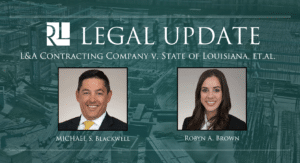
L&A Contracting Company v. State of Louisiana, et.al. 2023 WL 5281846
Recent First Circuit Decisions Holds Payment Bond Surety Liable Despite Release of Lien Bond Filing
Authors: Michael S. Blackwell and Robyn A. Brown
The Louisiana First Circuit’s recent ruling on public works project involving the Louisiana Department of Transportation and Development (“DOTD”) found that even when a release of lien bond is filed to cancel a statement of claim, the payment bond surety for the project can still be liable for a supplier’s nonpayment.
L&A Contracting Company v. State of Louisiana arises out of a public construction project to repair the U.S. Highway 11 bridges over Lake Pontchartrain (“Project”). The Project was owned by the DOTD and governed by La. R.S. 48:256.3, referred to as “DOTD Public Works Act.” DOTD executed a contract (“Contract”) with L&A Contracting Company (“L&A) to perform repair work, which included repair of bridge support pilings.
Prior to submitting their bid on the Project, L&A obtained quotes including from Vector Corrosion Technologies, Inc. (“Vector”) for the cost of the pile jacket assemblies. Ultimately, L&A contracted with another subcontractor who in turn entered into a purchase agreement with Vector to supply the pile jacket assemblies. After DOTD issued notice to proceed authorizing L&A to commence work on the Project, Liberty Mutual Insurance Company (“Liberty Mutual”), as L&A’s surety issued the statutory payment bond in accordance with La. R.S. 48:256.3.
At some point, L&A advised the DOTD that it would submit the remaining requests for stockpile payments – – which allowed a form of early payment under Section 109.06 of the DOTD’s governing specifications – – for the pile jacket assemblies with invoices from Vector, and noted these were at a lesser price compared to the marked up price submitted by L&A’s subcontractor for the pile jacket assemblies.
L&A and DOTD agreed to terminate the Project after they were unable to reach an amicable resolution on the unpaid balance of $968,019.80 owed to Vector viz-a-viz L&A, which DOTD claimed contained overpayments for the stockpiled materials on the Project. Subsequently, Vector filed a sworn statement of claim (“the Lien”), preserving its privilege and right to recover the $968,019.80 owed for the Project. L&A then filed a release of lien bond from Fidelity and Deposit Company of Maryland (“Fidelity”) pursuant to La. R.S. 48:256.7 in connection with Vector’s statement of claim.
In the resulting lawsuit, and among other claims pending within it, Vector also sought summary judgment against L&A as the Project’s contractor, Liberty Mutual on the payment bond, and Fidelity as the lien bond surety, as well as attorney fees from all of them.
In addition to other arguments the Court rejected, L&A also that Liberty Mutual’s payment bond was canceled by the filing of the release of lien bond by Fidelity. Under La. R.S. 48:256.3(A)(1), DOTD requires a contractor on a public works project exceeding $50,000.00 to furnish a payment bond. In accordance with La. R.S. 48:256.7, after Vector filed the Lien, and L&A deposited Fidelity release of lien bond, the Clerk of Court for Orleans issued a Certificate of Cancellation cancelling Vector’s lien from the mortgage records.
L&A relied on La. R.S. 48:256.7(B) to argue that Liberty Mutual’s payment bond was canceled when Fidelity’s release of lien bond was posted which relieved Liberty Mutual of any liability. Specifically, L&A emphasized La. R.S. 48:256.7(B)’s language that once the release of lien bond is found sufficient, then the recorder of mortgages will “cancel the statement of claim or privilege from his records by making an appropriate notation in the margin of the recorded statement.” In opposition, Vector cited La. R.S. 48:256.12 which holds in relevant part, “ [n]othing in this Part shall be construed to deprive any claimant, as defined in this Part and who has complied with the notice and recordation requirements of R.S. 48:256.5(B), of his right of action on the bond furnished pursuant to this Part”.
The Court considered the purpose of the Public Works Act and agreed with Vector. The Court noted that La. R.S. 48:256.7 does not state that a payment bond, posted in accordance with La. R.S. 48:256.3 will be cancelled or otherwise rendered null when a release of a lien bond is deposited, nor is there any indication that the legislature intended this result. Rather the clear wording of La. R.S. 48:256.7(B) provides that the statement of claim or privilege will be canceled. The Court further noted that if the legislature intended for a release of a lien bond to cancel the statutory payment bond, it would have expressly stated this.
Moreover, the Court noted the intent of the Public Works Act is to protect laborers and suppliers of materials on public works – which is achieved by requiring a statutory payment bond. Thus, the Court held that the statutory payment bond furnished by Liberty mutual remained viable after L&A deposited Fidelity’s release of lien bond.
From a practical standpoint, this decision effectively gives material suppliers and those claimants not in privity with the general contractor two separate avenues of recovery for unpaid amounts when a release of lien bond is filed on a public works project. On the other hand, it creates a scenario where each of the two sureties will ultimately fight over which one is forced to satisfy any judgment that a supplier may obtain. We anticipate that this is not the last time such a ruling will be addressed.



